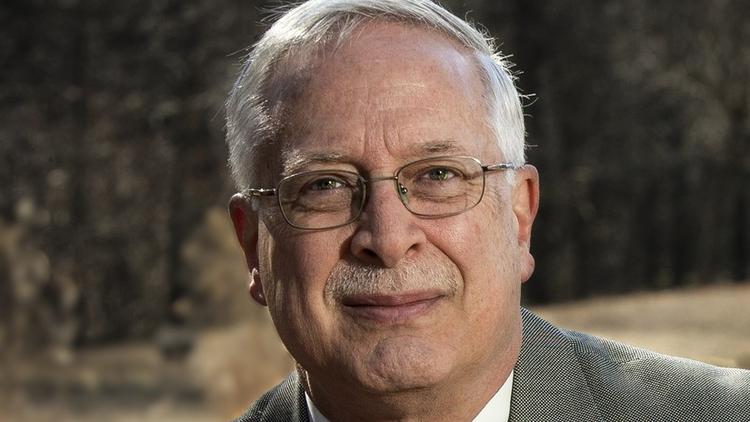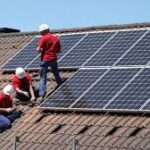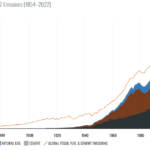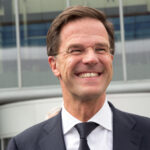
Hoe komt het toch dat apocalytische toekomstvisioenen en doemscenario’s zo’n aantrekkingskracht uitoefenen op grote groepen mensen, en misschien vooral intellectuelen? Immers, de economische ontwikkeling over de laatste eeuwen geeft daartoe geen aanleiding. In tal van opzichten zijn de levensomstandigheden voor grote delen van de wereldbevolking aanzienlijk verbeterd.
Maar toch, ons zicht op de toekomst lijkt vaak te worden gedomineerd door doemdenken. Tijdens de klimaattop in Parijs van december vorig jaar deinden onze leiders weer op de cadans van de onheilspellende AlGoritmen. Maar als we de trends uit het verleden doortrekken, wat zien we dan? Een vooruitgang zonder precedent in de menselijke geschiedenis!
De Amerikaanse professor (‘Business adminstration’), wijlen Julien Simon, was erg optimistisch over onze toekomst. Zijn bekendste boek was misschen wel: ‘Hoodwinking the Nation’, waarin hij krachtig stelling nam tegen het doemdenken van zijn tijd.
Bjørn Lomborg, die erop uit was om de denkbeelden van Simon onderuit te halen, moest in zijn magnum opus, ‘The Skeptical Environmentalist’, na minutieus en zeer kritisch onderzoek toegeven dat Simon grotendeels gelijk had.
Naast Lomborg zijn er thans een aantal andere auteurs die het geestelijk erfgoed van Julien Simon beheren, zoals Indur Goklany (zie hier en hier) en Matt Ridley.
Nu ook heeft Paul Driessen (ja, van Nederlandse afkomst) in kort bestek de feiten op een rijtje gezet.
Hij verwijst daarbij in eerste instantie naar Hans Rosling die op basis van een overvloed aan statistisch materiaal op indrukwekkende wijze de menselijke vooruitgang heeft gevisualiseerd. Zie video hier.
Paul Driessen:
Several years ago, physician, statistician, sword swallower, and vibrant lecturer Hans Rosling produced a fascinating 4-minute video that presented 120,000 data points and showcased how mostly Western nations became healthy and prosperous in just 200 years – after countless millennia of malnutrition, disease, wretched poverty, and early death.
More recently, professor of history and economics Deidre McCloskey provided some clues as to why and how this happened. In a Wall Street Journal article outlining “how the West (and the rest) got rich,” she notes that it wasn’t just Karl Marx’s “exploited workers” or Adam Smith’s “virtuously saved capital, nor was it only Hernando De Soto‘s and Douglas North’s essential property rights and other legal institutions.
Perhaps the most vital ingredient was that over those two centuries “ideas started having sex,” as author Matt Ridley described the ridleyprocess in The Rational Optimist. It enabled innovators to make discoveries and devise technological wonders, often through coincidental Connections that historian James Burke found among seemingly unrelated earlier inventions, to bring us television, computers and other marvels.
Why did ideas suddenly start having sex? McCloskey asks. One reason was the printing press, which enabled more people to read and share ideas. However, she cites two other principal developments: liberty and equality. Liberated people are ingenious, she observes – free to pursue happiness, and ideas; free to try and fail, and try again; free to pursue their own self-interests, and thereby better mankind.
En zo gaat Driessen verder met zijn lofzang op de menselijke vooruitgang. Maar waarom heeft niet iedereen daarvan kunnen profiteren?
Amid all this health, prosperity and longevity for so many – why do so many still struggle on the edge of survival? Why do two billion still have minimal electricity and another 1.3 people still have none at all? Why do two billion still exist on $3 per day? Why do a half-million still die every year from malaria? five million more from respiratory and intestinal diseases?
The formula for health and prosperity is no secret. It is readily available on your cell phone. ….
What should fascinate us is the miracle of poverty – the way inept, corrupt, greedy, centrally planned, hyper-regulated governments have prevented prosperity from happening. What should outrage us is that callous UN bodies, NGOs, and activists have imposed their eco-imperialist agendas, and prevented countries from acquiring the property rights and technologies that made so many nations healthy and rich.
What should concern us is that many forces are conspiring to roll back the free enterprise, free speech, the scientific method, and reliable, affordable energy that make modern living standards possible. Having them now does not guarantee them tomorrow. Failure to safeguard these essential foundations could take us on the path to joining the ranks of the “miracles of poverty” and FRCs: Formerly Rich Countries.
Aldus Paul Driessen.
Lees verder hier.
Voor mijn eerdere bijdragen over klimaat en aanverwante zaken zie hier, hier, hier, hier en hier.






Matt Ridley had mij zo goed uitgelegd hoe het allemaal was gekomen. Met die welvaart enzo. ( stoommachine, voedselvoorziening, Borlaug, Haber Bosch procédé ) en nu gaat deze schrijver weer iets heel anders vertellen.
En zo kunnen we nog jaren doorgaan. Ondertussen rollen de miljarden, worden de rijken rijker en de armen armer.
Hoe dit te duiden? Kijk eens naar zogenaamde “feiten” en hun communicatie daarover in de pers: Meldt het AD vandaag heel actueel, dat 1 op 10 niet-moslims niet tegen een nationaal suikerfeest zijn. Objectiever zou zijn te melden dat na onderzoek 9 op de 10 niet-moslims tegen een nationaal suikerfeest zijn. Het is hier slechts een voorbeeld, dat vooral ook in het klimaat- en energiedebat (te) dikwijls voorkomt. Die 1 op 10 is natuurlijk een stuk sexier en zogenaamd meer policor. Zo was de Parijs-COP21 een groot succes (sexier en policor!), terwijl iedere objectieve onafhankelijke criticus duidelijk het tegendeel zag gebeuren. Zo zijn windturbines goed en sexie (waarom eigenlijk, ze besparen geen CO2!), maar wordt de onder- en middenklasse belast met het betalen van de eco-belastingen onderwijl de gesubsidieerde windhandel-ondernemers rijker en rijker worden. Al eerder blogde ik dat alarmisme (= het bewust verkeerd voorstellen van zaken) de bron is en de roep is om meer subsidies en overheidsingrijpen (=meer ambtenaren). Dergelijk wordt door activisten als populisme afgedaan, maar is inhoudelijke kritiek op de handel en wandel van de heersende politiek en het functioneren van hun verbonden/afhankelijke journaille.
Meldt het AD vandaag heel actueel, dat 1 op 10 niet-moslims niet tegen een nationaal suikerfeest zijn. Objectiever zou zijn te melden dat na onderzoek 9 op de 10 niet-moslims tegen een nationaal suikerfeest zijn. Parijs-COP21 was een “groot succes” (sexier en policor!), terwijl iedere criticus duidelijk het tegendeel zag gebeuren. Al eerder blogde ik dat groen en rood alarmisme (= het bewust uitvergroten van zaken) de bron is en de roep is om meer subsidies en overheidsingrijpen (=meer ambtenaren).
Meldt het AD dat 1 op 10 niet-moslims niet tegen een nationaal suikerfeest zijn. 9 op de 10 niet-moslims dus wel tegen een nationaal suikerfeest. Parijs-COP21 was een “groot succes” (sexier en policor!), terwijl iedere criticus duidelijk het tegendeel zag gebeuren. Groen en rood alarmisme (= het bewust uitvergroten van zaken) is de bron en de roep om meer subsidies en overheidsingrijpen (=meer ambtenaren).
de schrijver beweert precies hetzelfde, alleen met een iets hoger abstractieniveau.
Hoe dit te duiden? Kijk eens naar zogenaamde “feiten” en hun communicatie daarover in de pers: Meldt het AD vandaag heel actueel, dat 1 op 10 niet-moslims niet tegen een nationaal suikerfeest zijn. Objectiever zou zijn te melden dat na onderzoek 9 op de 10 niet-moslims tegen een nationaal suikerfeest zijn. Het is hier slechts een voorbeeld, dat vooral ook in het klimaat- en energiedebat (te) dikwijls voorkomt. Die 1 op 10 is natuurlijk een stuk sexier en zogenaamd meer policor. Zo was de Parijs-COP21 een groot succes (sexier en policor!), terwijl iedere objectieve onafhankelijke criticus duidelijk het tegendeel zag gebeuren. Zo zijn windturbines goed en sexie (waarom eigenlijk, ze besparen geen CO2!), maar wordt de onder- en middenklasse belast met het betalen van de eco-belastingen onderwijl de gesubsidieerde windhandel-ondernemers rijker en rijker worden. Al eerder blogde ik dat alarmisme (= het bewust verkeerd voorstellen van zaken) de bron is en de roep is om meer subsidies en overheidsingrijpen (=meer ambtenaren). Dergelijk wordt door activisten als populisme afgedaan, maar is inhoudelijke kritiek op de handel en wandel van de heersende politiek en het functioneren van hun verbonden/afhankelijke journaille.
ik was daarnet in “den Aldi” … en na mijn kar volgeladen te hebben met drank en voedsel voor een week, diende ik een kleine 50 euro te betalen …
het daagde me dat “den Aldi” meer heeft gedaan voor de (minderbegoede) mensheid – en dat zonder extra kost voor de anderen – dan de gezamenlijke wettelijke dwingelandij van communisten, socialisten en andere wereldverbeteraars van de laatste 30/40 jaar …
dat steekt !
@Bert De schrijver beweert eender als Lomborg in The scepical environmentalist en Simon Rozendaal in Alles wordt beter. De bewoordingen zijn anders, maar de strekking is eender. Wel houden UN-lichamen de voortzetting van die ontwikkeling tegen, zo stelt de auteur.
Er is hoe dan ook iets mis met de mensheid, zeker op grote/globale schaal.
Want waarom zijn we in bepaald opzicht zo destructief?
Ligt het aan een paar individuen met extreem veel macht?
Of is het ‘iets’ wat in het DNA van de mens zelf besloten ligt?
Of is het ‘als we het te goed krijgen worden we lui en onoplettend’?
Ligt het aan scholing en onderwijs?
Worden we bewust dom gehouden?
Is er toch iets mis met democratie?
Waarom hebben we legers nodig?
Is ‘marktwerking’ wel een ideale situatie?
Wat is de rol van taal en dialecten? Hebben die een functie, en zo ja welke?
Vele dieren leven in kuddes of roedels. Zo ook de mens. In welke schaal grootte voelt de mens zich het best? Straat, buurt, dorp, stad, provincie, land, continent, global?
En wat is de rol/effect van de (massa) media? De politiek?
Is schaalvergroting van de mens-gemeenschappen een zegen of een vloek?
Gaan we die veelbelovende 21ste eeuw ooit beleven of is de mens juist enorm in decline?
Is de mens echt zo slecht voor moeder aarde zoals velen beweren?
Is overbevolking een probleem? Hoeveel mensen zou de aarde aan kunnen, rekening houdend met genoeg grondstoffen, voedsel en energie?
Hoe oud zou een mens kunnen worden onder de meest gunstige voorwaarden?
Hoeveel meer of minder stress heeft de moderne mens ivg met laten we zeggen de jaren 50 of 60 van de vorige eeuw. En zo ja, wat zijn de redenen van dit verschil?
Als welvaart decennia lang is toegenomen, zoals wordt beweerd, waarom vallen er dan zoveel winkelketens om?
Kan iemand bedenken wat Rusland/Poetin voor bedreiging vormen voor Europa?
Waarom kon de mens binnen 70 jaar vliegen en zelfs naar de maan, maar nog steeds geen echt medicijn tegen o.a. kanker na 160 jaar onderzoek? Met mil/triljarden aan onderzoeksgeld?
Vragen, vragen vragen. En het laatste waar ik me al druk over maak is dat ene stomme kudtmolecuultje CO2 op een totaal van 10.000 andere moleculen lucht wat de mens sinds 1860 heeft uitgescheten.
Blijft leuk: Rammstein – Amerika (Official Video)
https://www.youtube.com/watch?v=Rr8ljRgcJNM
En trouwens nog een swat: als wij zoveel respect voor andere culturen moeten hebben, waarom respecteren we dan niet als ze elkaar willen afmaken?
Zou het kunnen dat ze dan nog wat dingetjes hebben uit te zoeken?
Waarom respecteren we dat dan ineens weer niet?
————–
Vergeet de welvaart maar. Too little too late. We gaan dood met zijn allen! (volgens Leemans dan toch): http://www.nieuwsblad.be/cnt/dmf20160708_02376852
ik snap niet mijn reactie zoveel duimpjes naar beneden oplevert. Zo is het toch?
Matt Ridley, Rozendaal, Lomborg, Paul Driessen en ga zo maar door. Cees le pair , Labohm, Hetzler, van Ulzen. Ze schrijven hun vingers blauw. Toch allemaal niet zomaar wat mensen, maar de verantwoordelijken kijken gewoon de ander kant op.
Ondertussen werd deze week aangekondigd dat een aan te leggen windpark maar liefst 2 miljard euro goedkoper gebouwd kon worden en er ging een siddering van trots door het land.
In al die jaren was het kennelijk niet gelukt toch een redelijk simpel sommetje bij de beleidsmakers tussen de oren te krijgen waardoor het nooit had kunnen gebeuren dat de overheid de stroomvoorziening van een land zou verzorgen en garanderen met een productiemiddel dat een productiefactor van 20 % heeft, super inefficiënt is en bovendien niet eens kan voldoen aan het beoogde doel.
Duidelijk is geworden dat protesteren zinloos was.